Last Updated on January 5, 2023
Usually this topic about local prepositions in German is very reduced for beginners, but I give a more complete version so that everything is in one place.
Basic German grammar tables and translation exercises in Anki. 1
Basic German with tables. 2. Noun and articles
Basic German. 4. Time and prepositions of time in German
German picture description phrases and sequence
German test b1 Deutschtest für Zuwanderer. Writing examples
Difference between verschieden, unterschiedlich, anders
Short forms
When combined with the definite article, some prepositions form short forms.
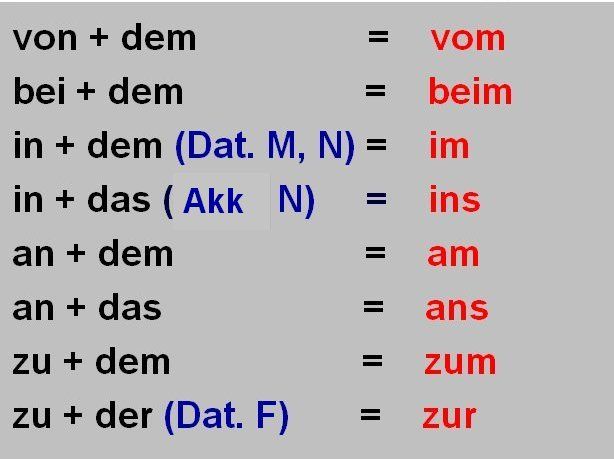
But if you need to emphasize the specificity of the place (this one), then the merger does not take place: in dem Haus (here in this house)
Prepositions used with both Dativ and Akkusativ
The 9 prepositions shown in the picture below have a peculiarity.
If we are talking about
WHERE the object is located, then DATIV is used.
If it is a question of
WHERETO the object is directed, then AKKUSATIV is used
Er ist im (in + dem) Zimmer (where is he? – in the room).
Er geht ins (in + das) Zimmer (where is he going? – to the room).
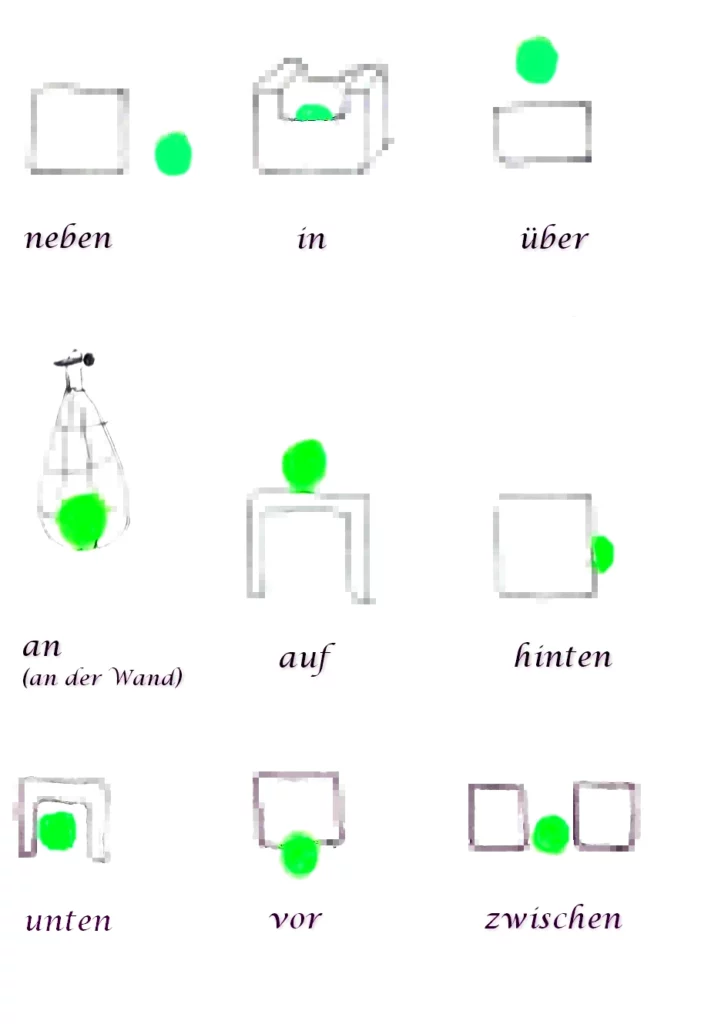
an (ans, am)
sitzen am Tisch (wo?)
an die Wand hängen (wohin?), hängt an der Wand (wo?)
fahren ans Meer (wohin?)
ans Telefon rufen
Means the location of an object near another object:
sit at the table, at the piano,
hang on the wall, on a tree
or on the edge of something (beach, sea, platform)
And also movement to the edge of something or placing an object to another object:
go to the sea,
walk up / call to the phone,
bring a glass to your lips,
hang it on the wall,
lean it against the door
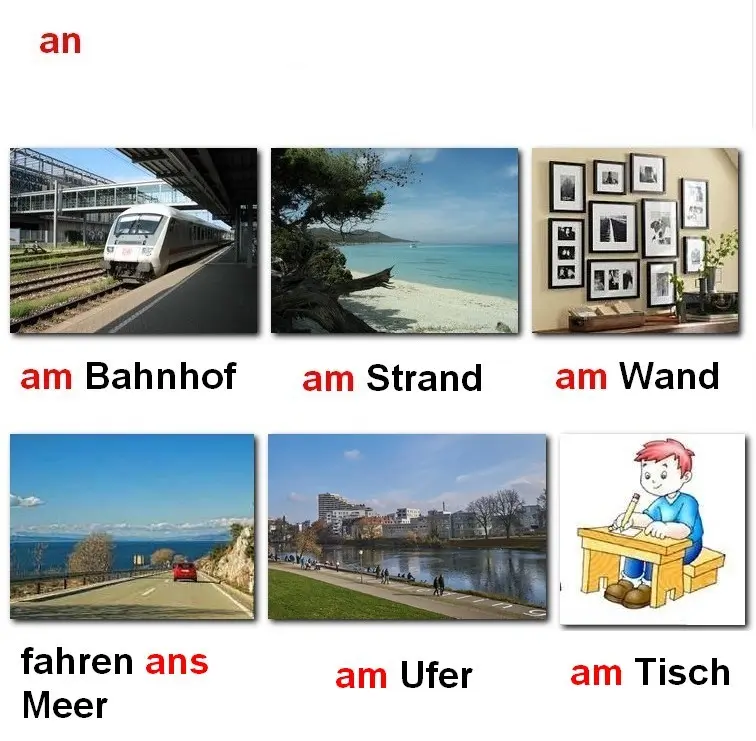
Auf
sein auf dem Boden, auf dem Tisch (wo?)
auf der Straße, auf der Insel
legen auf den Tisch (wohin?)
auf dem Konto sein (wo?), auf das Konto überweisen (wohin?)
fahren auf das Land, steigen auf den Berg (wohin?)
To be on a surface or place (an object or yourself) on a surface:
on the table, on the floor,
as well as on the island (in Cyprus, etc.) and in the village
gehen auf die Post, Bank, Universität, Polizei (wohin?)
auf den Bahnhof, Flughafen
auf der Hochzeit, dem Fest, auf der Reise, dem Spaziergang sein (wo?)
auf Arbeit, auf der Schule
In addition, it is used to indicate movement to objects-institutions (bank, train station, university, congress, airport, police, post office) and participation in something (wedding, holiday, travel, work)
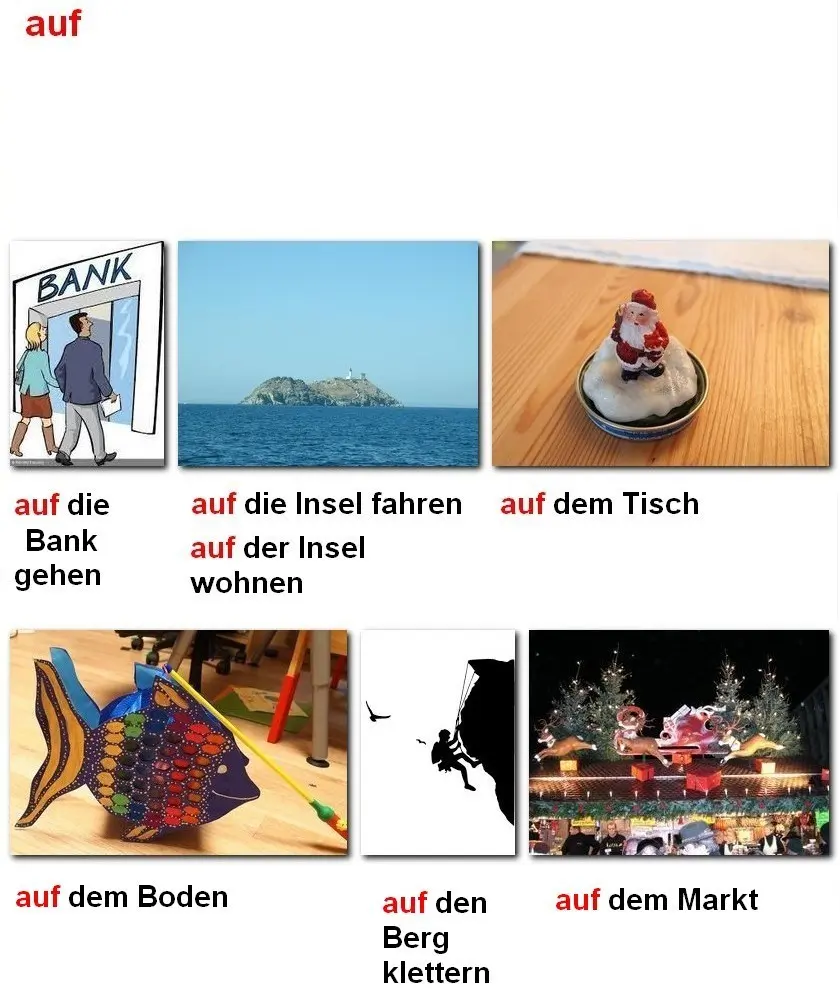
In (ins, im)
Im Bahnhof sein (im Theater, im Kino, in der Küche, in der Schule, in der Ecke…) (wo?)
In den Schrank legen (wohin?)
im Buch (wo?)
To be inside or placed inside.
I wonder here im Bett liegen – why not auf? Perhaps this is due to the fact that the beds used to look different in Germany: they looked more like a box and were closed by doors.
Ins Theater, ins Kino, in die Schule gehen (wohin?)
Go inside a building (cinema, museum, theater, room, etc.)
in die Ukraine (wohin?)
in die Schweiz
in die USA
Go to the country whose name is used with the article
in die Straße (wohin?)
turn off, go to some street
wohnen in München, in den USA, in Deutschland
To be in a country, a city
Über
über dem Tisch hängen
be over something
die Decke liegt über dem Sofa
cover
über die Straße, Brücke
klettert über die Mauer, springt über den Zaun
movement across (street, bridge, obstacle)

Unter
unter dem Tisch
sie trägt ein Kleid unter dem Mantel
sich unter die Dusche stellen
to be under something or movement under something
unter den Bewohnern der Südsee leben
be among (spectators, friends, papers)
Neben
neben dem Tisch, neben dem Rathaus sein
er legt das Besteck neben den Teller
Nearby, around
Hinter
hinter dem Haus
sich hinter einem Baum verstecken
hinter das Haus eine Garage bauen
den Stuhl hinter das Bett stellen
behind, after
Vor
er wartete vor dem Bahnhof
steht vor dem Fenster
das Buch liegt vor mir
das Heft liegt ja vor deiner Nase
Perlen vor die Säue werfen
In front of
Zwischen
zwischen den Steinen
zwischen den beiden Bäumen steht eine Bank
sich zwischen zwei Stühle setzen
die Garage zwischen die beiden Häuser bauen
wir mischten uns zwischen die Zuschauer
der Brief lag zwischen den Papieren
Between, among
Joint table
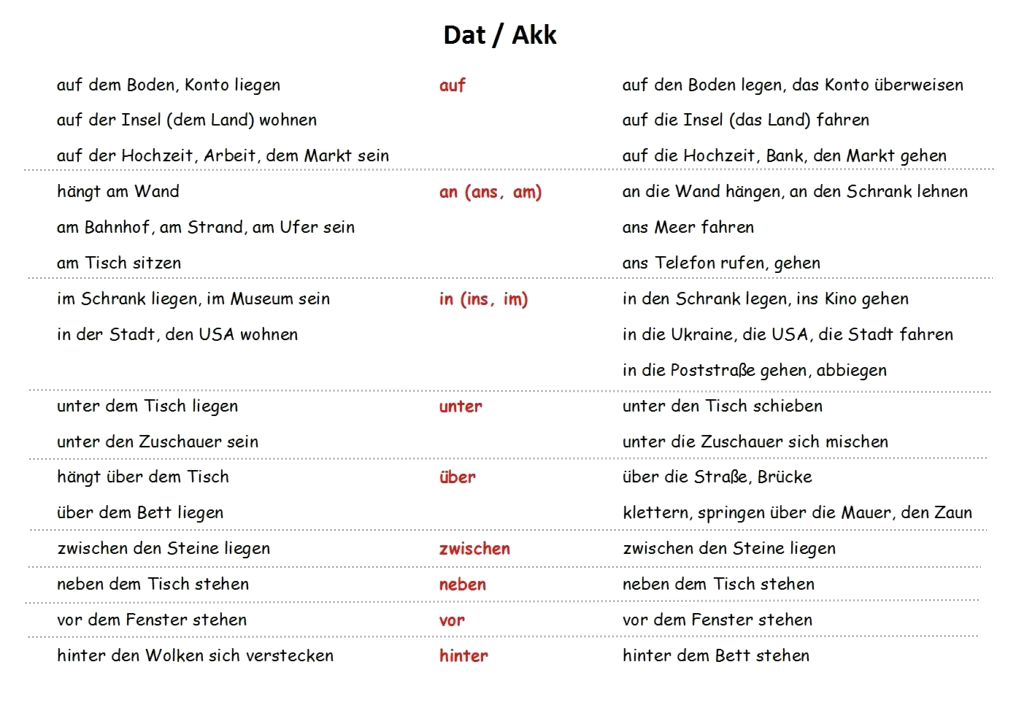
Only Dativ
There is such a common error when the rule located / directed is applied to each of the local prepositions. It is important to remember that only 9 prepositions change cases. The rest have a fixed case.
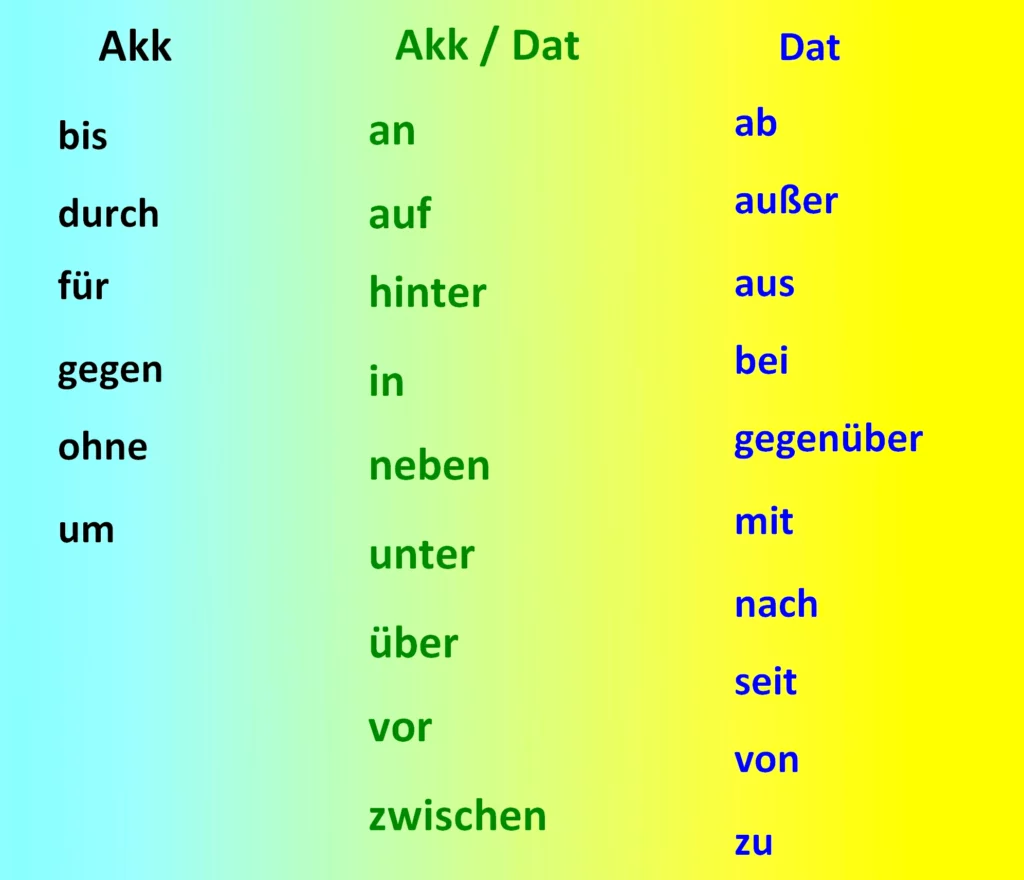
ab
geht ab Frankfurt,
ab der nächsten Ampel
Departure point
aus
aus dem Schrank, Bett, Fenster, Haus
Movement of the limited space, opposite in
aus Finnland
sie ist nicht aus unserer Stadt
the origin of the object (in general)
bei (beim)
bei München, der Parkplatz beim Rathaus
place / city nearby
er wohnt bei seinen Eltern
wir sind noch beim Zahnarzt
by someone
arbeiten bei BMW
place of work
gegenüber
gegenüber der Post
der Post gegenüber
mir gegenüber
opposite (across the square, etc.). Can come before or after a noun, but always after a pronoun
nach
fährt nach Frankfurt, nach Afrika, nach Deutschland
nach Süden
nach Hause
nach oben, nach links, nach vorne
direction (cities and countries without an article, parts of the world, adverbs of direction)
von (vom)
ich komme von meinem Bruder
das Regenwasser tropft vom Dach
ich soll dich von ihm grüßen
actual place of origin / appearance
zu (zum, zur)
zu meiner Freundin
zur Arbeit
zum Flughafen
sich zu jmdm. wenden
zur Versammlung, Probe gehen
target
zu Hause
er stand uns stets zur Seite
also be in a certain place, position (for example, to be at home)
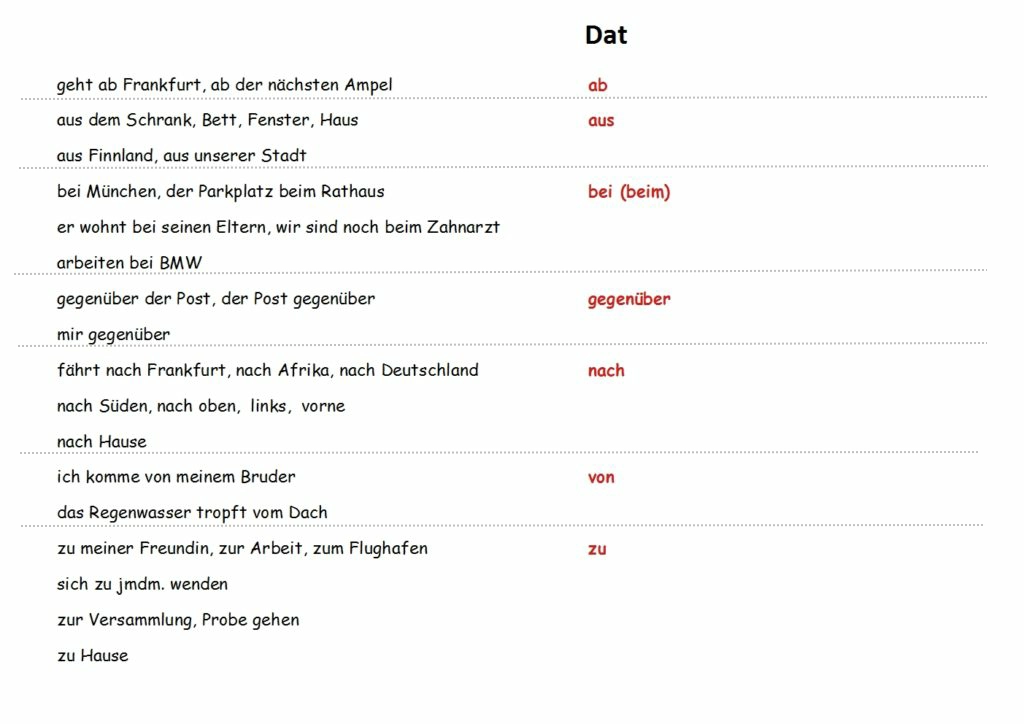
Only Аккusativ
bis
Zug geht bis Frankfurt
er war von Kopf bis Fuß, von oben bis unten neu eingekleidet
wir gingen bis zur nächsten Haltestelle
sie errötete bis an die Haarwurzeln
final destination. Bis is often combined with other prepositions, the case will then be according to the last preposition (bis zur Post – in this case Dat, since zu is always with Dat. In other cases prepositions with double subordination there is usually Akk, because question whereto?)
durch
geht durch die Tür
er schlägt einen Nagel durch die Wand
Fleisch durch den Wolf drehen
der Bach fließt durch das Tal
reisen durch das Land
durch die Stadt fahren
through, across
entlang
spazieren den Fluss entlang
along. Always after a noun
gegen
gegen einen Bus
etw. gegen die Wand werfen
the place of the collision,
etw. gegen das Licht halten
gegen den Strom schwimmen
sie standen Rücken gegen Rücken
die Haare gegen den Strich bürsten
against something (against the stream, against the light)
um (…herum)
einen Zaun um den Garten
er läuft um den Park herum
um die ganze Stadt (herum) gefahren
eine Kette um den Hals tragen
sie hat (schwarze) Ringe um die Augen
around
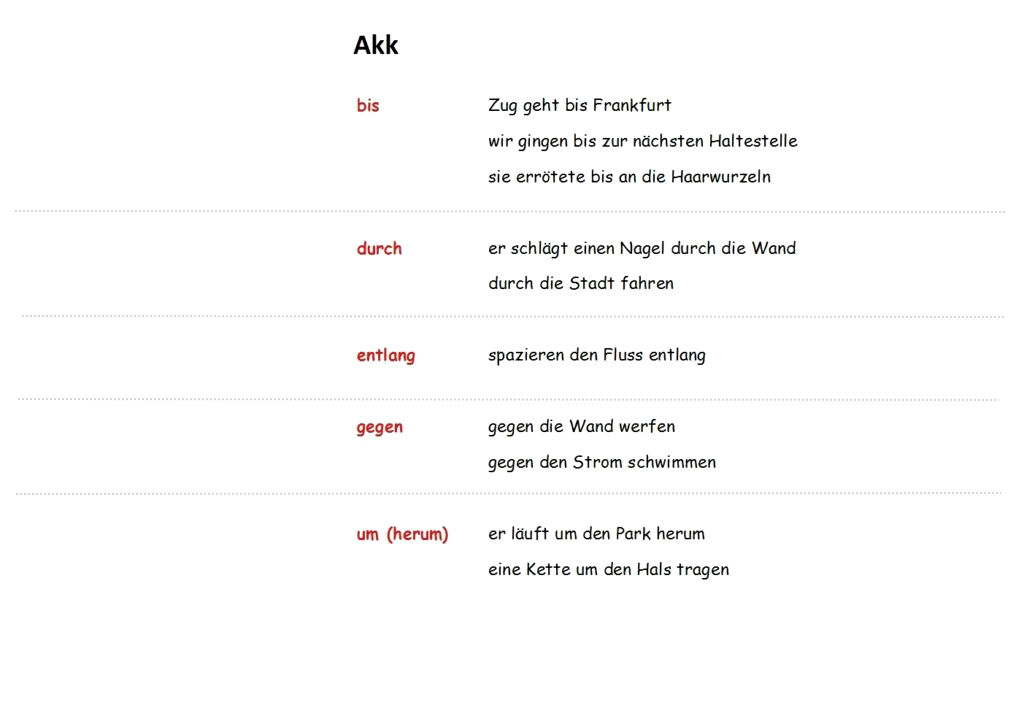
Follow me
Only Genetiv
außerhalb
außerhalb München
außerhalb des Hauses, Gartens, der Grenzen
outside, outward
innerhalb
innerhalb der Stadt
inside
Exercises for translating sentences in Anki – download the deck. The deck contains translations of sentences corresponding to the grammar and the words of relatives.
All topics with grammar exercises – #german grammar
All about Anki – #Anki
Next Basic German. 4. Time and prepositions of time in German
Do you enjoy the site without cookies and maybe without ads? This means that I work for you at my own expense.
Perhaps you would like to support my work here.
Or Cookie settings change: round sign bottom left
